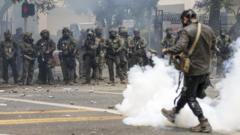Syrian authorities have arrested two senior members of the Palestinian militant group Islamic Jihad, signaling a pivot in the country's political dynamics under its new leadership.
Syria's New Leadership Shifts Alliances with Arrest of Palestinian Militants

Syria's New Leadership Shifts Alliances with Arrest of Palestinian Militants
Recent arrests signal a transformation in Syria's relationships with Palestinian factions, marking a departure from past alliances.
The Syrian government has made rare arrests of two prominent leaders from the Palestinian militant group Islamic Jihad, raising eyebrows amidst a backdrop of shifting alliances in the region. This significant move, reported on Tuesday, indicates a possible recalibration of Syria's relations with Palestinian groups that have historically operated under its aegis.
Khaled Khaled, the Islamic Jihad leader in Syria, and Yasser al-Zafari, another senior official, have been in custody for five days, according to the group. While Syria's interior ministry acknowledged the arrests, it refrained from providing any specific reasons. Islamic Jihad expressed dismay over the detentions, stating they were unexpected and left unexplained.
Under the regime of President Bashar al-Assad, Syria maintained a close alliance with Iran and acted as a foundational base for several Palestinian armed factions. However, since the overthrow of Assad in December, Syria's newly established authorities seem keen on asserting control over various armed groups and distancing themselves from Iran's sphere of influence.
In response to the geopolitical changes, the U.S. Trump administration has laid out conditions for an easing of sanctions imposed during Assad's rule, including tightening the grip on extremist factions in Syria. The new Syrian leadership, headed by Ahmed al-Shara, who initiated the request for the U.S. to reconsider sanctions, is urgently seeking relief to facilitate economic recovery and post-war reconstruction efforts.
These arrests come alongside a visit from Republican congressmen to Damascus, marking the first encounter of American lawmakers in Syria in many years and indicating a renewed interest in the country’s ongoing tumult.
As Syria navigates its post-civil war landscape, these developments highlight the intricate balance of power, both internally and within the broader Middle East region.
Khaled Khaled, the Islamic Jihad leader in Syria, and Yasser al-Zafari, another senior official, have been in custody for five days, according to the group. While Syria's interior ministry acknowledged the arrests, it refrained from providing any specific reasons. Islamic Jihad expressed dismay over the detentions, stating they were unexpected and left unexplained.
Under the regime of President Bashar al-Assad, Syria maintained a close alliance with Iran and acted as a foundational base for several Palestinian armed factions. However, since the overthrow of Assad in December, Syria's newly established authorities seem keen on asserting control over various armed groups and distancing themselves from Iran's sphere of influence.
In response to the geopolitical changes, the U.S. Trump administration has laid out conditions for an easing of sanctions imposed during Assad's rule, including tightening the grip on extremist factions in Syria. The new Syrian leadership, headed by Ahmed al-Shara, who initiated the request for the U.S. to reconsider sanctions, is urgently seeking relief to facilitate economic recovery and post-war reconstruction efforts.
These arrests come alongside a visit from Republican congressmen to Damascus, marking the first encounter of American lawmakers in Syria in many years and indicating a renewed interest in the country’s ongoing tumult.
As Syria navigates its post-civil war landscape, these developments highlight the intricate balance of power, both internally and within the broader Middle East region.




















